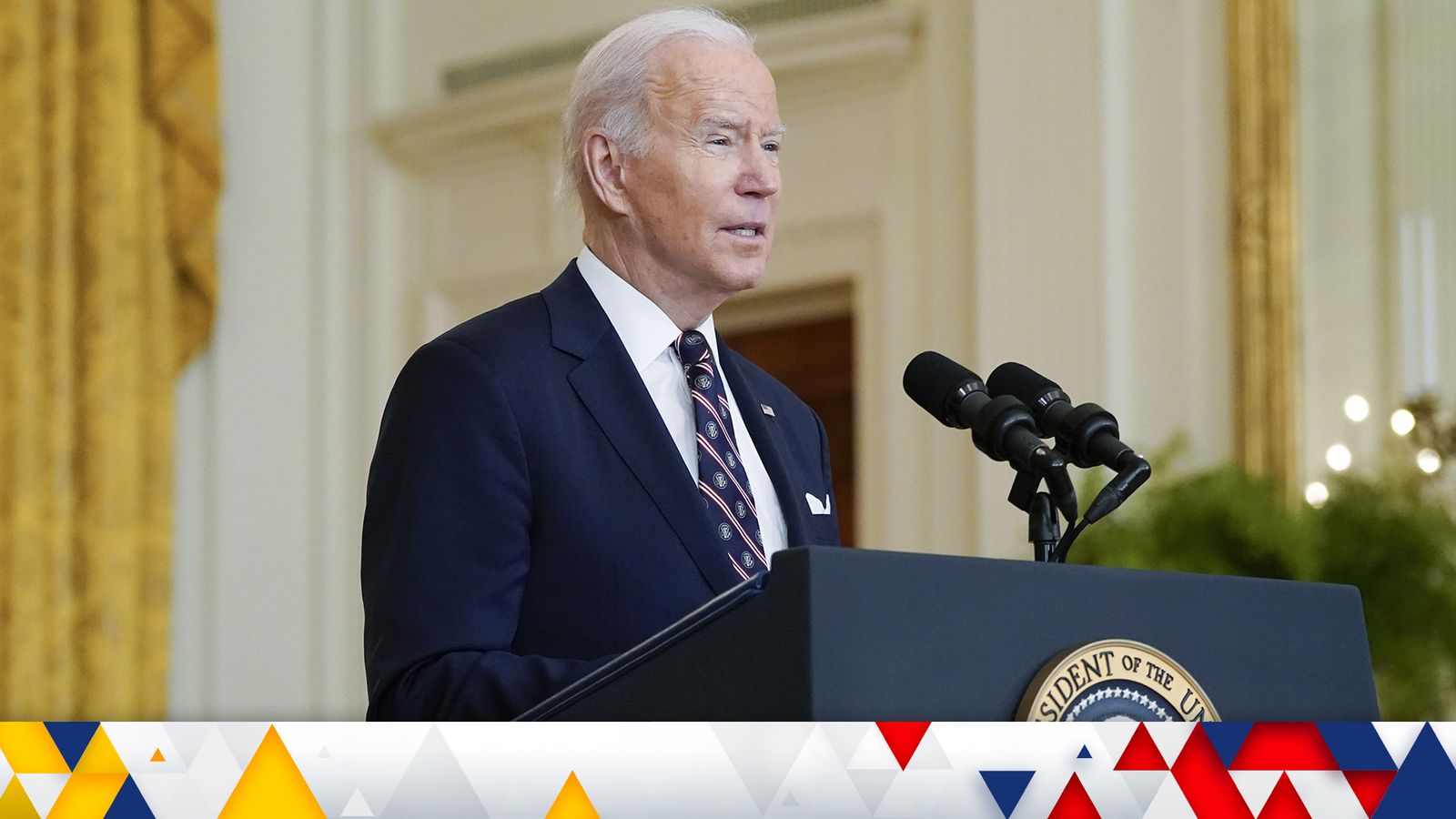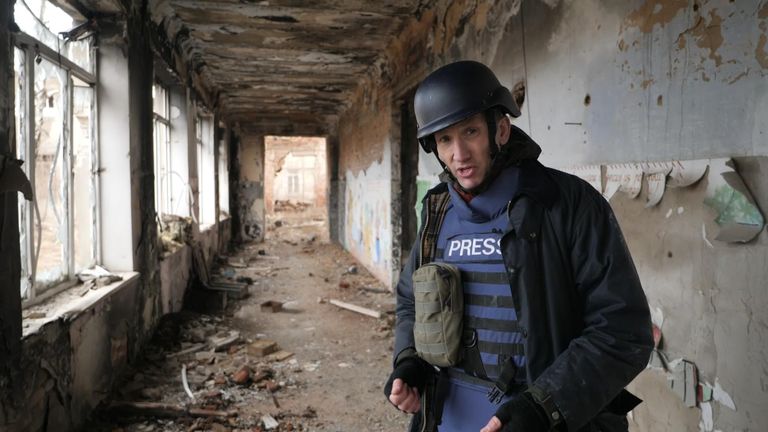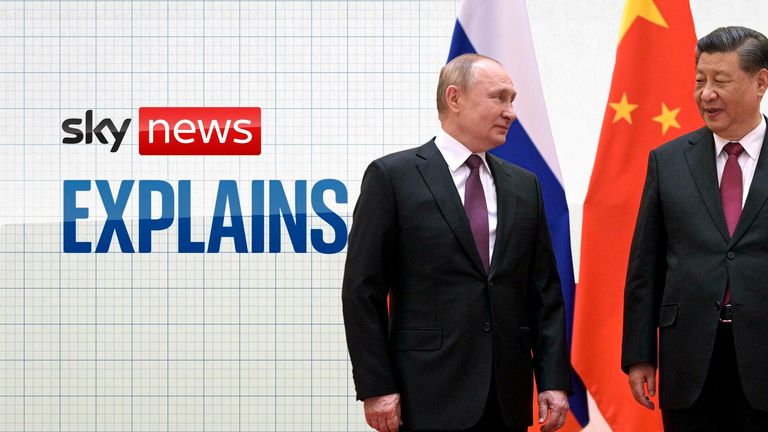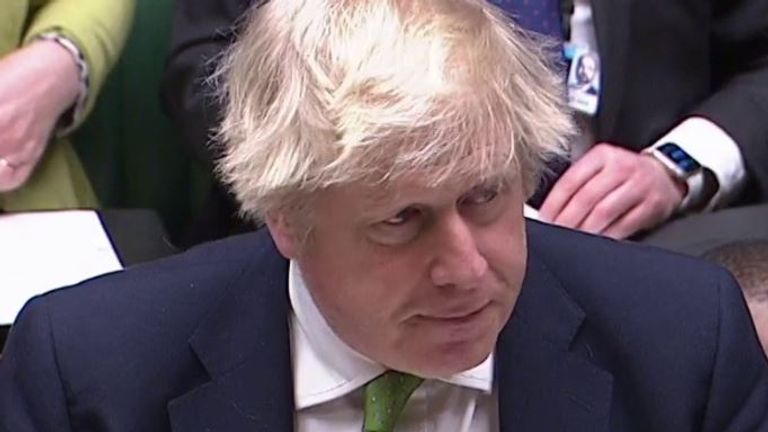Joe Biden has announced the first wave of US sanctions against Russia in retaliation for Moscow’s actions in Ukraine.
The US president said the penalties would be slapped on Russian banks and oligarchs.
Mr Biden told reporters that the deployment of Russian troops in eastern Ukraine after Vladimir Putin recognised the independence of two separatist-held regions marked the “beginning of an invasion”.
Mr Biden said his Russian counterpart was “setting up a rationale to take more territory by force” and he warned that Moscow would “pay an even steeper price if it continues its aggression”.
The US leader also said he had authorised the movement of additional forces and equipment to bolster NATO allies Estonia, Latvia and Lithuania.
Ukraine key developments:
- 800 US military personnel will be moved from Italy to Baltic region
- Up to eight US F35 jets moved from Germany to sites along NATO’s eastern flank
- Ukrainian president calls up reservists but rules out general mobilisation
- UK targets five Russian banks and three oligarchs with sanctions
- EU sanctions Russian MPs who voted in favour of recognition
- Germany halts approval of Nord Stream 2 gas pipeline
Mr Biden said: “I’m going to begin to impose sanctions in response, far beyond the steps we and our allies and partners implemented in 2014.”
The latest sanctions target Russia’s VEB bank and the country’s military bank, Promsvyazbank, which does defence deals.
Read more: How do Russia and Ukraine military’s compare?
The sanctions are also being applied to Russia’s sovereign debt.
“We have cut off Russia’s government from Western financing. It can no longer raise money from the West,” he told reporters at the White House.
He said they were just the “first tranche” of what the US and its allies were ready to put in place if Russia launches a larger invasion, with around 150,000 Russian troops massed on Ukraine’s borders.
Mr Biden also said that from Wednesday he would impose sanctions on Russian oligarchs and their families.
Read more: How strong is NATO’s position in eastern Europe?
Meanwhile, an infantry battalion taskforce of 800 US personnel will head to the Baltic region from Italy.
Also, up to eight F-35 fighter jets will be moved from Germany to locations along NATO’s eastern flank, 20 apache helicopters will be deployed to the Baltic region from Germany, and 12 apache helicopters will head to Poland from Greece.
“We will defend every inch of NATO territory,” he said, adding: “We have no intention of fighting Russia.”
Read more: Who are the key players in the Ukraine crisis?
In a fast-moving crisis, Russian legislators earlier gave President Putin permission to use armed forces abroad, with the move a possible sign towards a broader attack on Ukraine.
Moscow recognised the independence of Russian-backed rebel Luhansk and Donetsk regions in eastern Ukraine on Monday.
Mr Putin has laid out three conditions to end the crisis. He called for international recognition of Crimea as part of Russia, an end to Ukraine’s NATO membership bid and a halt to weapons shipments to the country.
The West condemned Crimea’s 2014 annexation as a violation of international law and has rejected permanently barring Ukraine from joining NATO.
Earlier on Tuesday, Boris Johnson said the UK was sanctioning five Russian private banks and three oligarchs, freezing their UK assets and banning travel to Britain.
The prime minister told the House of Commons it was the “first tranche” and “first barrage” of measures, in response to Russian troops moving into two separatist regions in eastern Ukraine.
One of the private banks was Bank Rossiya, based in St Petersburg, and the UK government mistakenly listed its address as Neglinnaya, 12, Moscow, 107016, Russia – which is the address of Russia’s central bank, known in Russian as Bank Rossiya.
The Foreign Office later issued an update to make “administrative corrections to two listings under the Russia sanctions regime” which gave the bank’s correct address.
The EU also issued sanctions aimed at 351 Russian politicians who voted to recognise the breakaway regions, as well as 27 other Russian officials and institutions from defence and banking.
They also sought to limit Moscow’s access to EU capital and financial markets.



